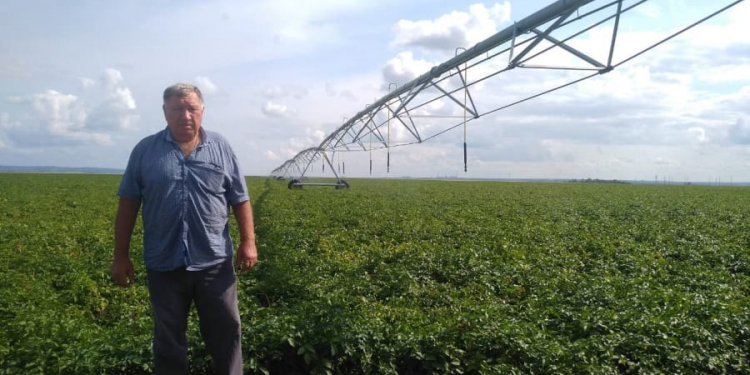Farmer Leonid Kichigin reaps high yields annually, and now he intends to provide the region with virus-free potato seeds. This year, a laboratory for micro-propagation of plants will be launched at the peasant farm.

When growers grow the same potato variety, they gradually lose crop volumes. At the same time, potatoes accumulate a bunch of diseases. Often, due to viruses, valuable varieties are removed from production.
Farmer Leonid Kichigin suggested his own solution to the problem. His farm is now included in the regional register of basic farms in the Angara region agro-industrial complex. Together with the regional branch of the Federal State Budgetary Institution “Rosselkhoztsentr”, the farmer has been developing primary seed production for many years, studying various varieties of potatoes.
– In the Irkutsk region there are many lands infected with the golden potato nematode. According to the latest data, there are already about 60 thousand hectares of them, mainly the private sector. Summer residents and gardeners can solve the problem with the help of virus-free seed production, says Leonid Kichigin. – By the end of the summer, we will launch our own laboratory for microclonal plant propagation in order to obtain highly reproductive seeds. The laboratory will help launch the process of improving the crops that are in demand among gardeners, including strawberries, wild strawberries, raspberries.
Due to the late spring and rainy early summer, the farmer has just completed the sowing campaign. He has 1,500 hectares in processing, including vegetables – 70 hectares, potatoes – 180 hectares, the rest of the area is occupied by grain crops – wheat and barley. The scientific approach makes it possible to collect about 10 thousand tons of vegetables.
– It’s too early to make forecasts. But potatoes, carrots and beets are not a concern. The weather is not very favorable for the onion, it needs heat. Let’s see what happens next, – said the farmer.

The development of peasant farms was facilitated by an investment project, within the framework of which it was possible to increase the area of vegetable crops, acquire modern equipment, lines for primary processing and storage of vegetables.
Leonid Kichigin is not used to relying on nature in his business. Still, farming in Siberia is a high risk. The use of irrigation systems helps the farmer to obtain a guaranteed yield. Thanks to participation in the federal program on land reclamation in peasant farms, the area of irrigated land will increase to 1250 hectares.
“Last year, 250 hectares of irrigated land were put into circulation, this year – 360 hectares,” the farmer specified.
Under the federal program, large-scale irrigation machines are purchased for peasant farms, which make it possible to use sprinkler irrigation. An even distribution of moisture occurs and a favorable water regime is created in the fields.
– We also use drip irrigation. This is when mineral fertilizers enter the soil along with water. The evaporation of moisture with this method is minimal, while the root receives all the necessary nutrients, the farmer explained.
Leonid Kichigin said that he does not experience any problems with the sale of manufactured products; at present, negotiations are underway on cooperation with the Slata retail chain. Therefore, a new crop of potatoes, carrots, beets and onions will be available in supermarkets this fall.
The Leonid Kichigin’s farm, together with the Federal State Budgetary Institution “Rosselkhoztsentr” in the Irkutsk region, develops its own primary seed production, is engaged in the variety study of potatoes. A laboratory for microclonal plant propagation, unique for the region, is intended to conduct experiments on the cultivation of virus-free potatoes, which should become a competitor to the Dutch. During long-term reproduction, potatoes accumulate diseases, mainly viral, which lead to its degeneration. The virus vaccine for vegetables, unfortunately, has not yet been invented.
The new laboratory will produce thousands of test-tube plants of virus-free seed potatoes each year under sterile conditions at the cellular level. During the breeding process, each line is checked for viruses. Material free from them will be admitted for subsequent grafting and propagation.








